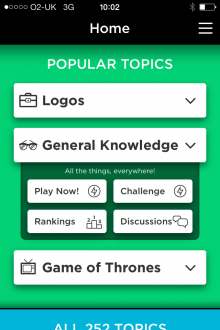Budcaddell
Shared posts
http://feedproxy.google.com/~r/imgfave/everyone/~3/7TDZAXQJ6H4/4294164
Sprint Wants To Revive Nextel As A Business Brand, Merge Boost + Virgin Mobile Into ‘Sprint Freedom’
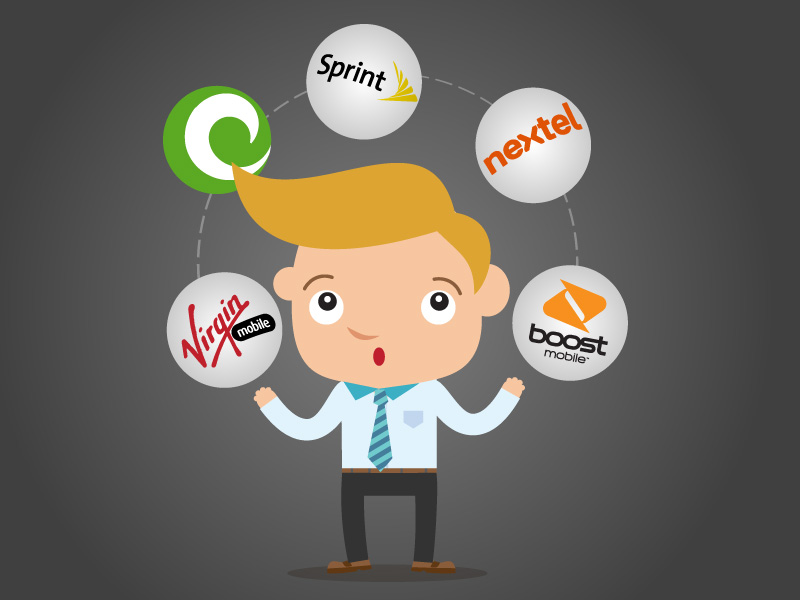
It was only six months ago that Sprint decommissioned and shut down the Nextel iDEN push-to-talk network, and while the carrier has no plans to bring that legacy service back, the brand is another story.
According to a source close to the company, Sprint wants to introduce Nextel again — as a brand for business services. The source tells TechCrunch that this is part of a larger branding overhaul coming in Q1 in which Sprint plans to launch a new prepaid brand called “Sprint Freedom” — merging Boost and Virgin Mobile.
Sprint declined to comment for this story, but if the information from the source is accurate, the moves point to Sprint raising its game targeting businesses (particularly smaller and medium businesses) as well as streamlining its patchwork of services.
It also fits with the idea of Sprint – now majority-owned by Japan’s SoftBank – marching on in consolidation mode, shoring up to present a more competitive face against the likes of AT&T and Verizon. Most recently, Sprint has been reportedly preparing an offer for T-Mobile USA, its latest move after acquiring Clear and buying a portion of U.S. Cellular earlier this year.
The Nextel service, our source says, will be part of a bigger push to court business customers. That makes some sense: Nextel’s existing business subscriber base, and brand recognition with that segment, were seen as some of the main reasons behind Sprint’s $35 billion acquisition of the company in the first place.
The new Nextel business, says the source, will be underpinned by more service streamlining: it will be a “premium” offering consisting of the 4G fixed and mobile broadband services that were originally the Clear business. The Nextel name, our source says, will go “on top of everything that was Clear and then target businesses.”
Along with previously-Clear services, there will also be more devices introduced, specifically around Sprint Spark — the tri-band LTE service debuted earlier this year that gives users faster speeds and more reliable connectivity.
Introduced with smartphones from HTC (the One max), LG (G2) and Samsung (Galaxy Mega and Samsung Galaxy S4 mini), Sprint Spark will be extended with two hotspots and three tablets as part of the offering.
And with that, some changes also around pricing, apparently. “Unlimited data options will come back for the hotspots at a premium, but pricing will be tiered by speed,” the source claims. Sprint will also introduce group plans that will apply to the new Nextel devices.
Sprint Freedom
Another part of plan, says that source, concerns Sprint’s prepaid businesses Virgin Mobile and Boost. Collectively, users on these two networks may generate less revenue than Sprint’s postpaid operations, but they serve as a useful counterbalance to the other service, adding customers last quarter as the number of ARPU-rich postpaid users declined.
Like Nextel and Clear, Virgin Mobile and Boost came to Sprint via acquisitions, and it looks like the carrier is now putting that in order, too.
Boost and Virgin Mobile will get wrapped into a new, single service called “Sprint Freedom.” It’s not entirely clear but it sounds as if this could mean the eventual scrapping of the two existing brands. Assurance Wireless, the free mobile phone service provided by Virgin Mobile under the Universal Service Fund, will not be affected, our source says.
While a lot of these plans sound like logical consolidation moves for the company, the question mark will be whether Sprint will manage to juggle all the changes without dropping anything (or anyone) in the process. A new Nextel business service would effectively mean a double-leap with a set of legacy products: first turning the Clear service into one focused less on consumers and more on businesses; and second rebranding it as a Nextel offering, but different from what Sprint was selling as a Nextel service not too long ago.
In the meantime, it is also not clear how a service called Sprint Freedom would sit alongside other services also called “Freedom” — such as Sprint’s international calling plans, not to mention the Freedom Pop “free” wireless service that is a wholesale customer on Sprint’s network.
And just as the closure of the Nextel brand earlier this year may have left some wondering whether Sprint would really let Nextel disappear into thin air, now the same might be said for Boost, Virgin Mobile and Clear. “It’s been a contentious issue for many,” our source said of the internal response to the changes. Perhaps one reason why these details got leaked to us.
[Image modified from Shutterstock]
Google’s Chromebooks Have Hit Their Stride

It looks like Microsoft was right to worry about Google’s Chromebook project. According to the latest numbers from NPD, Chromebooks accounted for 21 percent of all laptop sales and almost 10 percent of all computer sales to businesses in 2013. That’s up from virtually nothing in the year before. Given that Apple is irrelevant in commercial channel sales (it commanded a whopping 1.8 percent of sales), Chromebook’s increased share is coming at the cost of Windows.
A few years ago, Chromebooks were a bit of a laughing stock. They were underperforming single-purpose laptops that weren’t even good at the only thing they could do (that is, surf the web). Nobody really warmed up to them, despite their low price. Early sales were more than disappointing, and even Google’s few hardware partners looked like they were only doing this as a way to court Google’s favor. The whole project seemed doomed from the start.
But somehow, Google stuck to its guns and over the last two years, Chromebooks somehow went from being irrelevant to actually making a sizable dent in the laptop market. And not just in the business market. Amazon this week reported that two out of its three best-selling laptops during the holiday season were Chromebooks.
Two years ago, it seemed Chromebooks were only doing somewhat well in schools. Those were, after all, also the only numbers Google ever shared. Over the last year, however, something changed. Google created a more diverse ecosystem of hardware partners that now includes virtually all major laptop manufacturers, including the likes of Lenovo (though only for education), HP, Toshiba and Acer.
With the $1,300 Pixel, Google even designed its own high-end Chromebook. My feeling is that Google gave away more free Pixels to developers at its I/O conference this year than it actually sold (that high purchase price is hard to justify for anybody who doesn’t regularly fly on a private jet, despite the Pixel being a great piece of hardware). What the Pixel did, though, was to show that Google was fully backing this project, which surely helped the ecosystem and potential business customers to warm up the idea, too.
Over the last year, ChromeOS also went from a one-trick pony to something that’s more like a “real” operating system (in the sense that it looks and feels more like a regular PC and less than a laptop that can only run a browser). While Microsoft loves pointing out that Chromebooks are only useful when you’re online (which these days is pretty much true for any computer anyway), one area Google’s engineers worked hard on was adding more offline capabilities.
Today’s Chromebooks are nothing like the old Cr-48 prototype Google once sent out to bloggers in late 2010. The fact that Microsoft has now started making fun of them just shows that it’s concerned about losing market share in the business world. Microsoft should be worried.
http://ffffound.com/image/92440253154a49dba4a967ae0d017e56a7e31e99
Amazon sold 426 items per second in run-up to Christmas

Just like last year, Amazon is reporting that the 2013 shopping season was its biggest yet, not just in terms of its sales, but also with its services. The company announced today that on Cyber Monday alone, more than 36.8 million items were ordered worldwide, up from last year's 26.5 million items — that's about 426 items purchased per second. Amazon Prime broke records as well, gaining more than 1 million new members in the third week of December.
Kindles and Kindle Fire tablets topped Amazon's bestseller charts, with most sales coming over the Cyber Monday weekend. Once again, Amazon held back on the hard numbers for those sales, but even without much-needed context, it is clear that Amazon isn't suffering when it comes to its...
How A Fabricated Story About Iron Maiden’s Love Of Music Pirates Became Internet Truth

Wouldn’t it be awesome if heavy metal icons Iron Maiden leveraged data about which regions of the world pirated their music to plan a multi-million dollar global concert tour? Yeah, it’d be awesome, if it were true.
So awesome to my anarchistic ears that I was halfway through reblogging the reblog of a Rolling Stone story before I learned that I couldn’t actually verify any of the facts.
In the last 48 hours, tech and music outlets have heaped praise on the supposed the tech savviness of the 80s metal band, who allegedly analyzed Bittorrent data to plan a concert tour in South America. Bittorrent, a popular peer-to-peer file-sharing client, can often reveal hidden fan bases around the world, since the traffic and contents can be analyzed in aggregate.
Musicmetric, an entertainment forecasting startup that analyzes bittorrent and social media data, was quoted in a Guardian piece on November 29, arguing that bands could potentially leverage the wealth of online information to plan their concerts.
Then, on December 20, a tech blog, citeworld, ran this click-delicious headline “How Iron Maiden found its worst music pirates — then went and played for them.” The piece implied that MusicMetric directly advised Iron Maiden to plan an otherwise unscheduled concert tour in South America.
“[The] CiteWorld story is sadly not substantiated,” a spokesman for MusicMetric wrote to me in an email. “We never stated or implied that Iron Maiden had used our analytics to plan its tours.”
“Once someone writes it and someone tweets, there’s not a lot that anyone can do,” said the MusicMetric spokesman, who preferred to remain anonymous. Despite the glowing press coverage, MusicMetric worries about taking credit for something they clearly didn’t do.
In fairness to my fellow writers, I was part of the hype machine. I retweeted the story before I had the chance to fully read it. In the course of writing this post, Citeworld has issued an apology and correction, but that hasn’t stopped the Internet rumor machine from cranking out more stories today.
After all, it seems like a plausible story. Indeed, beloved science fiction writer Neil Gaiman has become a full-fledged piracy supporter, after finding out that regions that pirated his books also bought more of them.
“Places where I was being pirated, particularly Russia, where people were translating my stuff into russian and spreading it out into the world, I was selling more and more books,” he gushed.
I suppose it’s possible that Iron Maiden has, in fact, used Bittorrent data to plan their South American tour. I reached out but haven’t heard immediately back. But, I wouldn’t bet any Bitcoin that they do.
This isn’t the first time that the Internet rumor machine has come to the wrong conclusions. During the manhunt for the Boston Marathon bombers, amateur sleuthing wrongly suggested that missing student, Sunil Tripathi, might be the culprit. The rumor eventually spiraled out of control into front-page headlines implying that Tripathi was enemy #1.
I really wish MusicMetric had advised Iron Maiden on how to make millions of dollars from music pirates. It’s such a good story. Too good, evidently, to be true.
[Image Credit: Lee McLaughlin]
QuizUp trivia app for iOS now has more than 5 million players… and it only launched last month

QuizUp, the trivia app from Plain Vanilla Games, is celebrating passing its five million player milestone just weeks after it first launched for the iPhone.
The success and phenomenal rate of growth are likely due to the baked-in social features which make it a doddle to challenge friends or strangers alike.
According to the company, the average QuizUp player is spending 30 minutes using the app per day “playing matches, browsing topics, messaging friends and participating in discussion boards”. To date, over 11 million messages have been exchanged through the QuizUp app, it added.
In addition to attracting huge numbers of players, the Icelandic studio has also attracted a Round B investment totalling $22 million from Tencent Holdings and Sequoia Capital.
Despite its undeniable popularity, shortly after launch the company was forced to respond to controversy surrounding the sending of user data in plain text and the use of ‘ghost’ players.
Nonetheless, it’s obviously impressing a lot of people – $22m is a frankly staggering amount for what is essentially a quiz app among hundreds of others.
➤ QuizUp
The inventor of the AK-47 just died and Twitter is firing parting shots

The man who designed the AK-47 assault rifle, which has killed more human beings than any other firearm, just died himself at the ripe old age of 94. Shortly after the news broke, Mikhail Kalashnikov’s name was trending on Twitter, with many users deploying the customary “RIP.”
But not everyone is wishing him a happy afterlife. Because he leaves a complicated legacy of carnage and terror in his wake, some simply had to spit on his grave. Here are a few of the hardest truths—and funniest cynical punchlines—to come out of Kalashnikov’s demise:
the inventor the AK-47, Mikhail Kalashnikov just died. Wouldn't have happened if he was carrying.
— Desus (@desusnice) December 23, 2013
But his legacy lives on! RT @Naharnet: #Breaking AFP: The designer of the AK-47, Russia's Kalashnikov, has died.
— DavidKenner (@DavidKenner) December 23, 2013
The inventor of the AK-47 has died. 80s movie villains everywhere are mourning the loss.
— Jason Brooks (@JasonMuses) December 23, 2013
Mikhail Kalashnikov, creator of the AK-47 rifle, Is Dead. He died peacefully in his home of natural causes.
— Achilles Stamatelaky (@astamate) December 23, 2013
So... you mean to tell me Ice Cube didn't invent the AK-47?
— Mike Andrick (@MikeAndrick) December 23, 2013
Mikhail Kalashnikov, creator of the AK-47 just died at 94. Sure beats riddled with bullets from automatic rifle fire at 19.
— High In America (@highinamerica) December 23, 2013
What's frustrating is that if you're smart enough to invent the Ak-47 you're probably smart enough to invent like a better washing machine.
— James Murtagh (@jamesmurtagh) December 23, 2013
Mikhail Kalashnikov, inventor of the AK-47 rifle, is dead at 94. As someone who has been shot at by his creation, can't say I'm mourning.
— Mike Glenn (@mrglenn) December 23, 2013
#ThanksObama RT @MailOnline: BREAKING: AK-47 inventor Mikhail Kalashnikov dies aged 94 - @AP
— daveweigel (@daveweigel) December 23, 2013
Inventor of the AK-47, Mikhail Kalashnikov, died today at the age of 94. Gangsta rappers everywhere are wearing their pants at half-mast.
— Charlie Speez (@CharlieSpeez) December 23, 2013
AK-47 inventor Mikhail Kalashnikov has died. Expect the #NRA to feel worse about this than they did about Sandy Hook.
— TBogg (@tbogg) December 23, 2013
The NRA, though, has yet to comment on the matter—probably too busy arranging a 21-machine-gun salute.
Photo by Michael Van Dyke/Flickr
How design thinking inspired ColaLife
ColaLife is amazing idea that didn't come from Coke. It's result of a very smart hacking of Coke's gigantic distribution system. Simon Berry, an aid worker in Zambia, noticed that availability of Coca-Cola in very remote areas is greater than that medicines that can save life. This sparked an idea: why not use Coke's distribution system to deliver life-saving anti-dirrhoea kits? Coke's incredibly vast network of local distributors penetrates nearly every corner of Earth, and getting medicines to remote areas can be very costly and often frustratingly slow and irregular business.
The real insight, however, was not utilizing Coke's existing distribution system. It was creating a way to transport the medicine within it, as seamlessly as possible. The solution came in the form of an AidPod container that can be perfectly wedged between Coca-Cola bottles, so it can be distributed at no additional cost.
Great example of creativity under constraints.
The next level of content and commerce integation
Is there a better shopping context for Leica camera than Instagram? Leica clearly thinks the answer is no. Instagram is place of budding photographers, photo enthusiasts, and just those in love with a good photo (among others). All of them can now purchase this camera right there on Instagram, without ever leaving their newsstream.
Actually, it's not as simple as that, but smart people will probably find a way to make it better. As of now, purchasing is enabled by Arco (a tech startup) in combination with following Leica Brazil's Instagram account. After this, all it takes to become a proud owner of the LeicaC is to comment "purchase" on one of the account's photos.
Fashion brands, jump on it!
Relive the first tech bubble with Monopoly: The .com Edition

In November 2000, Hasbro released Monopoly: The .com Edition. The board game came just in time for Christmas—and the dot-com bubble bursting. By the end of that year, the Nasdaq had lost more than half its peak value.
Not to jinx the current boom in Silicon Valley, but now seemed like a good time to revisit this special edition of Monopoly. “Are you ready to to log on and hyperlink your way to overnight fame and fortune in the exciting world of e-commerce?” asked the instruction booklet (pdf), which detailed all the ways in which The .Com Edition differed from the original. For example…
The money was denominated in millions of dollars, so the smallest bill was seven figures.

Properties on the board were popular websites like Geocities, Ask Jeeves, and iVillage. The equivalent of Boardwalk and Park Place were Yahoo and Excite@Home.

Instead of railroads, there were AT&T, Sprint, MCI Worldcom, and Nokia.

The tokens included a surfboard—you know, for surfing the World Wide Web.

Startups were the surest path to riches.

Banner ads were considered lucrative…

…and so was playing the stock market.

But storage was expensive…

…and connecting to the internet was fraught.

Life on the web could be distracting…

…but web browsers looked pretty much the same as today.

Photos by Gloria Dawson
Backed By Steve Blank & More, Startup Genome Founders Launch Next-Gen Benchmarking Tool For Startups
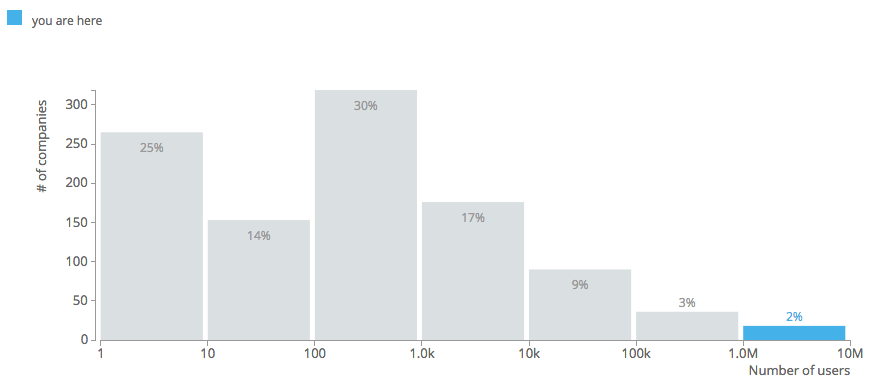
Three years ago, a team of researchers, entrepreneurs and data geeks set out on an ambitious mission: To put the world’s technology startups under the microscope in an effort to better understand why some succeed and why 90 percent eventually go the way of the dinosaur.
Fast forward to today, and The Startup Genome (as it’s now called) has analyzed data from over 100,000 startups around the globe and has conducted hundreds of in-depth, qualitative interviews with entrepreneurs and investors. The results provide an exciting look into not only what characteristics and qualities make for a successful formula, but how different startup ecosystems stack up with each other.
The team behind the project has also begun to leverage its unique data sets to create a benchmarking tool to enable entrepreneurs to evaluate their progress compared to their peers and help them make more informed product and business decisions. This month, after more than a year of testing and tweaking, the team finally released Compass into the wild.
Compared to prior iterations, Compass founder and CEO Bjoern Herrmann (who is also one of the co-founders of The Startup Genome Project) tells us, the now fully-baked startup benchmarking tool offers automated data collection from a host of tools and services popular among SMBs, including services like Salesforce.com, MailChimp, Google Analytics, Mixpanel, PayPal, Quickbooks and Stripe.
Using data derived from the sources, Compass then funnels your startup’s business metrics into its revamped dashboard, allowing them to view company benchmarks across a range of categories, configure an alert system to stay up to date on company revenue, churn rate, user growth rate, acquisition costs and so on, while offering visualizations of that data in correlation charts, graphs and via tailored, supplemental analysis.
But the real key to the new Compass product, Herrmann says, its the new dynamic system its team developed to generate benchmarks based on large data sets. Up until today, most benchmarking solutions have relied on 50-year-old methodologies to collect and analyze data, so, the team has instead developed a methodology designed specifically for Big Data analysis.
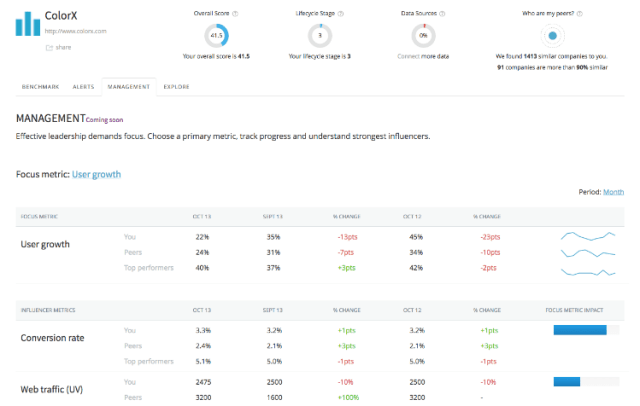
For example, prior iterations of Compass only grouped companies in to two categories — B2B or B2C — which, of course, is a fairly limited taxonomy given the diversity of startups out there. The new product, however, places companies along a continuous spectrum based on the “complexity of customer interaction,” Herrmann explains. On one end of the spectrum, for example, will be Google Search and businesses that rely on less complex customer interactions, while, on the others side would be, say, Oracle.
The spectrum for “complexity of customer interaction,” the founder explains, is defined by looking at the interplay between a business’ transaction and traffic history. The founder compares the methodology to Google’s first dynamic ranking system for indexing and search results, except, in this case, it’s the methodology used to determine the best benchmarks to use for your company. It’s also the technology that allows Compass to provide a similar level of benchmarking accuracy to a wide range of businesses — from restaurants to retail.
As of now, Compass is free to use and the CEO says that this will remain true for the forseeable future. However, Herrmann did says that the team has begun to test premium features, which will likely include full customization, additional filters, data segmentation and so on.
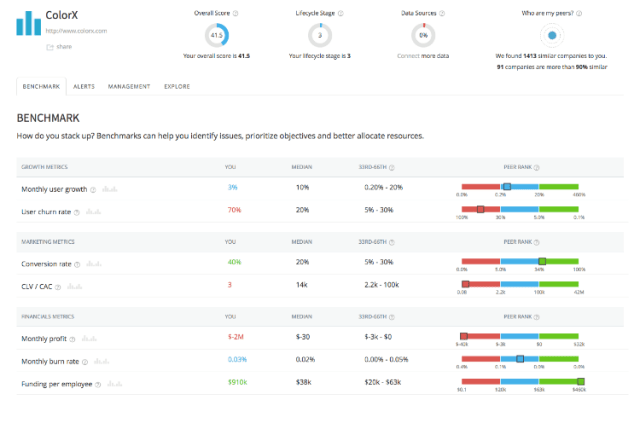
Up until now, the Compass team has made most of its money via R&D for governments and consulting firms and by offering sponsored versions of its “Startup Genome Reports.” Moving forward, Compass will also begin piloting a handful of potential revenue channels, including matching companies to value-add products and services, providing automated audits of startups for investors or bye working specifically B2B transactions, or companies within large organizations. The other option, Herrmann said, is to allow financial customers, for example, to manage their relationships with their tech customers.
Going forward, in support of its launch and the continuing experimentation with new revenue channels, Compass’ team has raised a total of $700K from, you guess it, a flock of Angels. Those angels include Amir Banifatemi, Anil Sethi, Ben Congleton, Christopher Grey, Clemente Germanetti
Daniel Recanati, Erik Jansen and more.
With its new money in tow, and 1,400 new businesses joining its platform over the last 10 days, Herrmann said that the team plans to put its capital to work hiring data scientists for its research project and engineers for Compass.
For more, find Compass at home here and Startup Genome here.
Humming Timing: This timer app for iPhone counts down using music from your library
There’s already a slew of funky timer apps for iOS, but Humming Timing reckons it has something that sets it apart from the rest.
Simply set your hour, minute and second counter and hit ‘Go’. It will then automatically play tunes from your music library that matches the designated time. So, if you want to boil an egg for four minutes, Humming Timing will find a song that roughly matches the duration and play it.
Naturally, the more music you have in your library, the more chance it will have of finding songs of adequate length. And if you’re timing something for longer than the duration of your typical song, it creates a playlist automatically.
Humming Timing available to download for free now.











